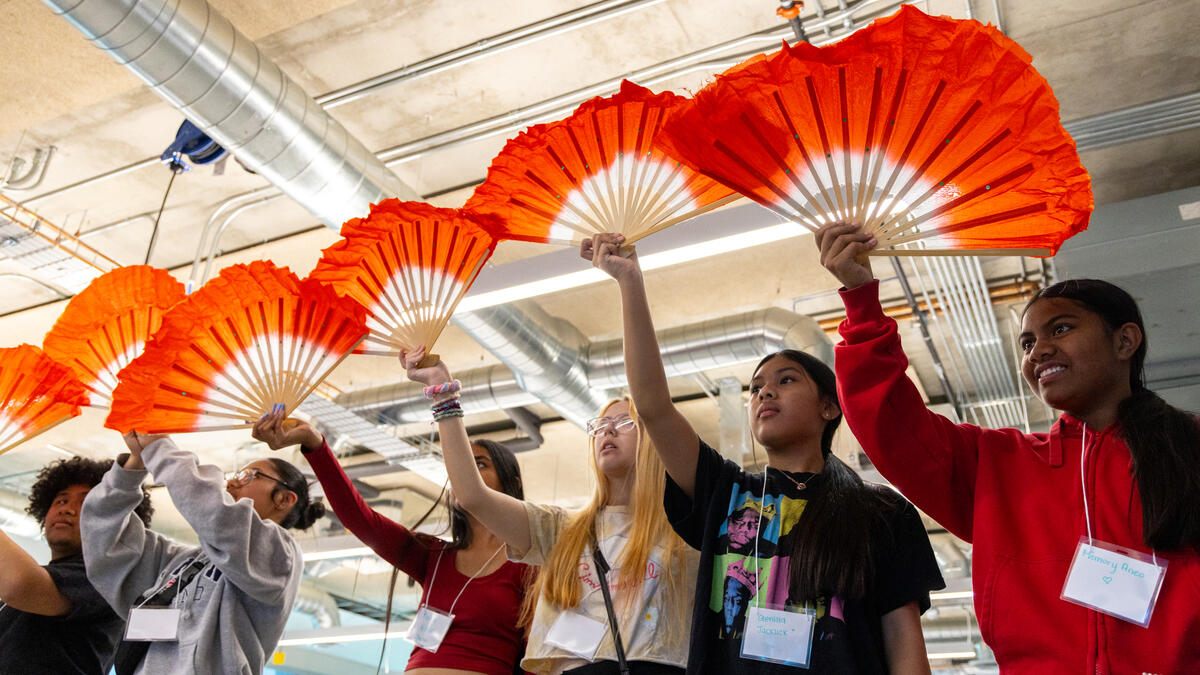High school students gather at ASU for annual Asian Pacific Advocacy, Culture and Education program

Students practice a fan dance they learned at the Asian Pacific Advocacy, Culture and Education Academy, a five-day summer program that takes place each summer at ASU for local Asian American, Native Hawaiian and Pacific Islander (AANHPI) high school students. The academy provides a unique space to help them find connections between their cultural identity, history, community and professional development. Photo by Meghan Finnerty
Across the U.S., Asian American, Native Hawaiian and Pacific Islander (AANHPI) communities have a longstanding and rich history of resiliency and contributing to improving society, both locally and nationally. Yet cultural stereotypes and outright racism are issues many youths in AANHPI communities still grapple with as they come of age.
The Asian Pacific Advocacy, Culture and Education (APACE) Academy is an annual five-day summer program at Arizona State University for local AANHPI high school students that provides a unique space to help them find connections between their cultural identity, history, community and professional development.
This year, “Students got to learn about radical healing, which is how we cope with and promote resilience and well-being in the face of racism and structural inequities in our society,” said Brandon Yoo, an associate professor with a joint appointment in ASU’s School of Social and Family Dynamics and the School of Social Transformation who serves as program lead for the academy.
APACE Academy is conducted through the help of experts in the community and at ASU, including faculty, staff and students. This year, experts presented on topics including Asian American stereotypes and history; culture and history of Hawai’i; South Asian history and experiences; Asian American mental health; community and music-making.
Yoo said APACE Academy is important for youth because it offers a space for students to develop a greater knowledge of AANHPI history, foster an openness to others and gain more confidence in their cultural identity.
In a feedback survey, one student wrote that “the program impacted me because I was able to learn about Asian American cultures that were often skipped during history lectures.”
To close out the academy each year, students participate in a mock trial, for which they prepared for the entire week with the Arizona Asian American Bar Association volunteers.
“Students enjoyed this activity, and performing for their family and community helped build their professional development, public-speaking skills and teamwork abilities,” Yoo said.
The students also took photos and made a poster collage of their own ways of radical healing, which was shared during the closing ceremony.
“One of the main themes across all of our students' posters that offered them hope, strength and resiliency was family, friends and community,” Yoo said.
Yoo and other organizers are looking forward to next year, when APACE Academy will celebrate its 30th anniversary.
More Arts, humanities and education

ASU professor's project helps students learn complex topics
One of Arizona State University’s top professors is using her signature research project to improve how college students learn science, technology, engineering, math and medicine.Micki Chi, who is a…

Award-winning playwright shares her scriptwriting process with ASU students
Actions speak louder than words. That’s why award-winning playwright Y York is workshopping her latest play, "Becoming Awesome," with actors at Arizona State University this week. “I want…

Exceeding great expectations in downtown Mesa
Anyone visiting downtown Mesa over the past couple of years has a lot to rave about: The bevy of restaurants, unique local shops, entertainment venues and inviting spaces that beg for attention from…




